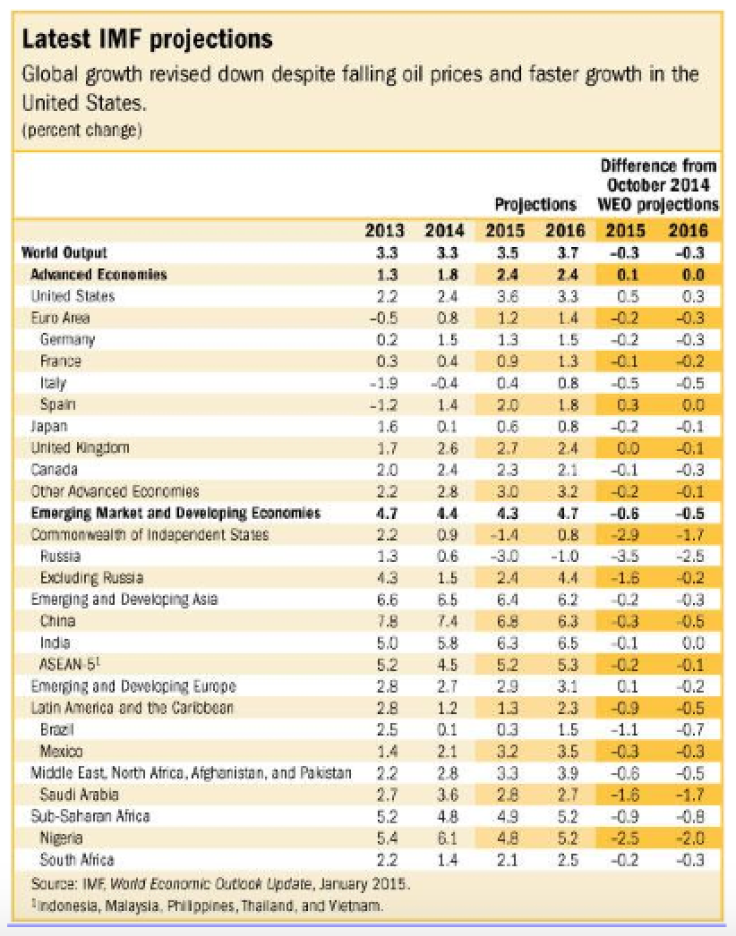IMF cuts global growth projections despite lower oil prices

Despite the boost from lower oil prices, the global economy is unlikely to grow as much as it was projected three months ago as the crisis-related negatives continue, the International Monetary Fund has said in its latest World Economic Outlook (WEO).
The IMF now projects global growth at 3.5% for 2015, revised down from 3.8% in October. It is expected to grow to 3.7% in 2016, that too 0.3 percentage point down from the last WEO.
"Even with the sharp oil price decline — a net positive for global growth — world economic outlook is still subdued, weighed down by underlying weakness elsewhere," the IMF said.
"New factors supporting growth — lower oil prices, but also depreciation of euro and yen — are more than offset by persistent negative forces, including the lingering legacies of the crisis and lower potential growth in many countries," said Olivier Blanchard, IMF Director of Research.
The Fund said downside risks to recovery are more for oil exporting as well as dollar-linked economies and less for oil importing as well as euro or yen-linked ones.
"It means good news for oil importers, bad news for oil exporters. Good news for commodity importers, bad news for exporters. Continuing struggles for the countries which show scars of the crisis, and not so for others. Good news for countries more linked to the euro and the yen, bad news for those more linked to the dollar," Blanchard said.
Advanced vs emerging
The IMF said it now sees higher growth in the developed world in 2015 than it was projected in October driven by US and Spanish growth rates, which have been revised by 0.5 and 0.3 percentage points respectively.
The new estimate for the advanced economies is now at 2.4% from 2.3% in October. For 2016, the rate is seen steady at 2.4%, unchanged from the last WEO as a 0.3 percentage point upward revision in the US growth forecast has offset the impact of downside revisions elsewhere.
At the same time, the projections for emerging market economies have been slashed by 0.6 percentage points to 4.3% for 2015 and by 0.5 percentage points to 4.7% for 2016.
In the emerging world, the reduction was the highest for Russia, growth forecast of which has been cut by 3.5 percentage points to -3% for 2015 and by 2.5 points to -1% for 2016. For the entire Commonwealth of Independent States, the projections have been lowered by 2.9 and 1.7 percentage points to -1.4% and 0.8% growth rates.
China's 2015 growth projection has been cut by 0.3 percentage points to 6.8% and the 2016 projection has been lowered by 0.5 percentage points to 6.3%.
Policy priorities
The IMF said weaker global growth forecasts underscore the need to raise actual and potential growth in most economies.
"This means a decisive push for structural reforms in all countries, even as macroeconomic policy priorities differ," the WEO said.
The IMF said in most advanced economies, lower oil prices will boost demand and lower inflation, but it may also contribute to a further decline in inflation expectations, increasing the risk of deflation.
"Monetary policy must then stay accommodative to prevent real interest rates from rising, including through other means if policy rates cannot be reduced further. In some economies, there is a strong case for increasing infrastructure investment."
Lower oil prices can alleviate inflationary pressure and external vulnerabilities for many emerging economies, giving room to central banks to delay raising policy interest rates, the IMF said.

© Copyright IBTimes 2024. All rights reserved.






